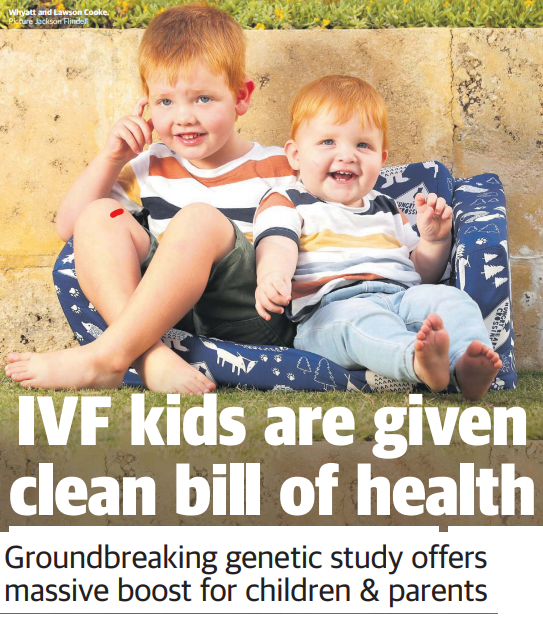
April 2021: New research from the University of Western Australia (UWA) and the Women and Infants Research Foundation (WIRF) using data from the Raine Study is being heralded as a major breakthrough in how we understand the longer-term health outcomes for children born via in vitro fertilisation (IVF).
Lead investigator Professor Roger Hart, Professor of Reproductive Medicine at UWA, Head of Fertility Services at King Edward Memorial Hospital and WIRF Research Fellow, and his team of researchers including the Raine Study’s Scientific Officer Blagica Penova-Veselinovic, examined the epigenetic profile – the non-genetic influences on how a person’s genes are expressed – of 303 teenagers born via IVF. They compared this to the epigenetic profile of 1,188 members of the Raine Study, a group of young people who had been conceived naturally, without IVF assistance.
They found no difference in the DNA analysis between the two sets of children.
Professor Hart said the study was largest and most detailed of its kind to-date, and that the conclusions reached by the study will provide great reassurance to IVF children, their families, and all those currently undertaking and considering IVF treatment.
The unique value of The Raine Study
For researchers in Australia and around the world, this study illustrates the value of having access to the data held by a longitudinal cohort study. In the case of the Raine Study, data has been collected from the same nearly 2,900 participants at regular intervals for over 30 years, since before they were born through to adulthood – at 1, 2, 3, 5, 8, 10, 14, 17, 18, 20, 22, 27 and 28 years of age. Future follow-ups continue to be planned.
More than 30,000 pieces of data and over 30 million pieces of genetic information has been collected on each of these participants, creating a very powerful pool of data which sheds light on the longitudinal effects of environmental as well as genetic factors. As in the case of this IVF study, understanding both sets of factors is crucial to our understanding of health and disease over the whole course of human life.
The full paper, ‘DNA methylation patterns within whole blood of adolescents born from Assisted Reproductive Technology are not different from adolescents born from natural conception’ has been published online in Human Reproduction and can be viewed here.
A media release from WIRF contains further information. Mainstream media reporting of the study include The West Australian, PerthNow, and 9News Perth (28 April 2021).
About the Raine Study
Established in Perth in 1989 with funding from the Raine Medical Research Foundation, the Raine Study was the first of its kind to track participants from before they were born, to determine the role that early life events from the womb onwards would have on later life.
A total of 2,900 pregnant women were recruited by the Raine Study between 1989 and 1991 (Gen1), and 2,868 live births were entered into the cohort (Gen2). These children, their parents, grandparents (Gen0) and now their own children (Gen3) form a unique multi-generational study, which has been helping researchers and policy makers better understand the causes of human health and well-being for more than 30 years.
After three decades, discoveries from the Raine Study continue to have significant impact on health policy, practice, and education around the world through ground-breaking multi-institutional research that examines influences, pathways and outcomes through all aspects of human life.
The Raine Study is Australia’s longest-running public health study, and one of the most extensive multi-generational cohort studies of pregnancy, childhood, adolescence and adulthood anywhere in the world.
About the Women and Infants Research Foundation
The Women and Infants Research Foundation is one of Australia’s leading medical research institutes dedicated to improving the health of women and infants. Its research and programs are focused on three principal areas: the prevention of preterm birth, gynaecological cancers, and women’s mental health. As a world-leader in preterm birth prevention, its research and programs have directly contributed to a number of improved clinical practices and significantly improved health outcomes. For more information, visit https://wirf.com.au/
